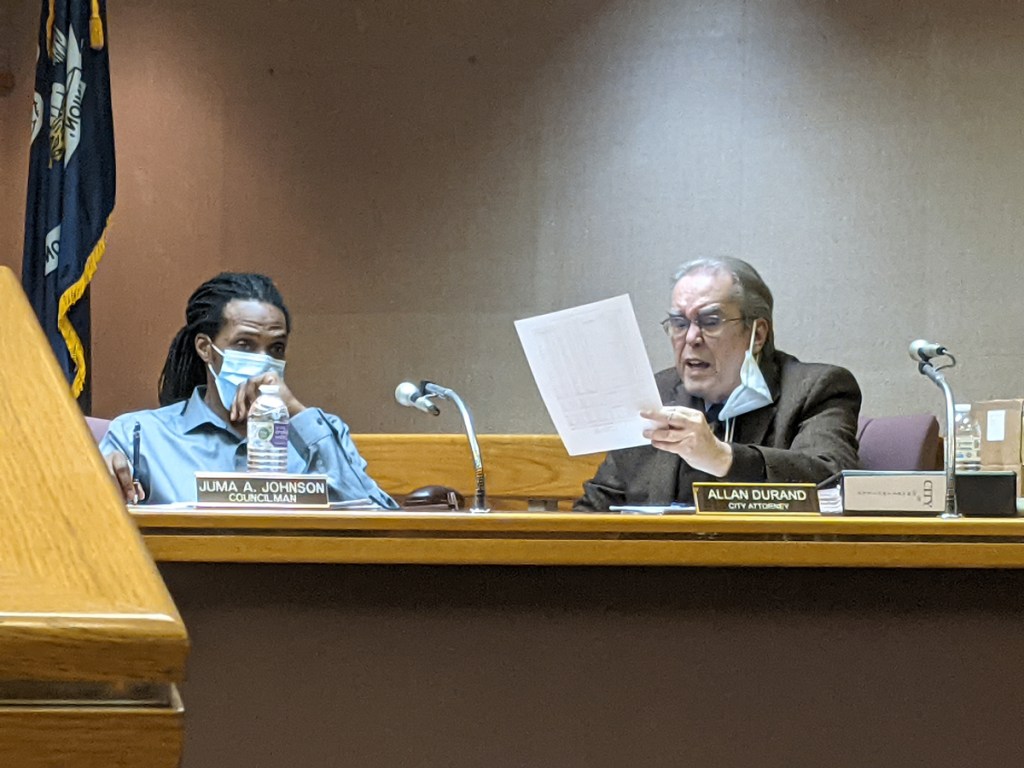Proposal to shut off power to 5 mobile homes in park
Published 8:00 am Wednesday, February 3, 2021

- City Legal Counsel Allan Durand disagreed with some of the statements from attorney Steven Lanza during Monday night’s discussion over issues at the Evangeline Mobile Home Park.
ST. MARTINVILLE — The years-long debate between members of the St. Martinville City Council and the owners of the Evangeline Mobile Home Park may finally be approaching resolution — one way or another.
After an at times contentious conversation between Lafayette attorney Steven Lanza, who is representing the estate of former Evangeline Mobile Home Park owner Mark Brignac, and Mayor Pro Tem Craig Prosper, Prosper made a motion to have the electricity cut off to the five mobile homes that are currently under a high-power line in the park.
“In 90 days we cut the power off,” Prosper said in calling for the motion. “If we go to court, we go to court. There will be a lot exposed there, I tell you.”
Brignac and the council had been at loggerheads over work to be done to the electrical infrastructure at the park for years. Although the city did previously replace power poles and lines along one side of the park, the lines and poles on the other side were not able to be repaired because city Public Works supervisors said oversized mobile homes had been moved into lots designed for older, smaller homes, blocking the utility easement.
The argument over the remaining work — and, more specifically, who would pay for it — has gone on for the last two years.
Brignac died earlier this year. Lanza is now representing Brignac’s estate and, consequently, the mobile home park.
Before coming down to his ultimatum, Prosper, District 1 Councilman Mike Fuselier and City Legal Counsel Allan Durand spoke with Lanza, at times showing frustration over what they called his “misrepresentation” of discussions over the past years.
“When we were negotiating these agreements, there were only two of us in the room, me and Mr. Brignac,” Durand said later. “For someone else to try to explain the intent of the discussion is ridiculous.”
Lanza at one point claimed that an agreement that Brignac proposed for a 10-foot easement was all he had to do to have the city assume full responsibility and cost for the replacement and re-routing of the lines for the oversize mobile homes in question — a position Prosper and Durand vociferously denied.
“The 10-foot-wide right of way is a joke,” Prosper said. “Mr. Brignac bought a trailer park for 50-foot mobile homes. You cannot put an 80-foot mobile home in this park. There is more going on here than you are saying.
“This started after the election,” Prosper continued. “Mr. Brignac ramrodded this through. I say we go 90 days, then if it isn’t resolved we cut the power off. There is between 6 and 7 foot between some of the trailers and the property line. Try to get a bucket ruck in there — some kind of magic math to make that happen.”
Durand suggested as an interim that the council pass a resolution to have power shut off to the park in case of severe storms to prevent any fires or other catastrophes, but that suggestion was not acted on.
“The problem could be solved tonight if Mr. Lanza and the property owners would agree to pay the $20,000 that would be required to make the changes,” Durand said.
“We are not going to talk about that today,” Lanza said. “You had a proposal. Mr. Prosper rejected it. I am happy to receive a call.”
St. Martin Parish President Chester Cedars was also on hand Monday night to present a plan for a consolidated St. Martin Parish water production facility to the council.
“This is something I started looking at back in 2018,” Cedars said. “We did a survey of rural water systems that serve our parish, and there is a lot of duplication of services.”
Cedars went on to explain how the increase in regulatory requirements, coupled with replacement costs and maintenance, make running smaller water systems an expensive proposition.
“We have the industrial water plant from back when we were servicing Martin Mills,” Cedars said. “Three water wells were built to service that potential industrial complex, Martin Mills in particular. That plant has the capacity to provide one million gallons per day. The most it ever produced is 500,000 per day. All we have the need for is 400,000 a day.”
The cost of continuing to operate the St. Martinville water production facility has caused issues in recent years, both in finding trained operators to keep the pumps running at the well and to figure out the proper rate to charge to keep the system operating within federal guidelines.
“Two or three companies coming together to form one company is where you get your economies of scale,” Cedars explained.





